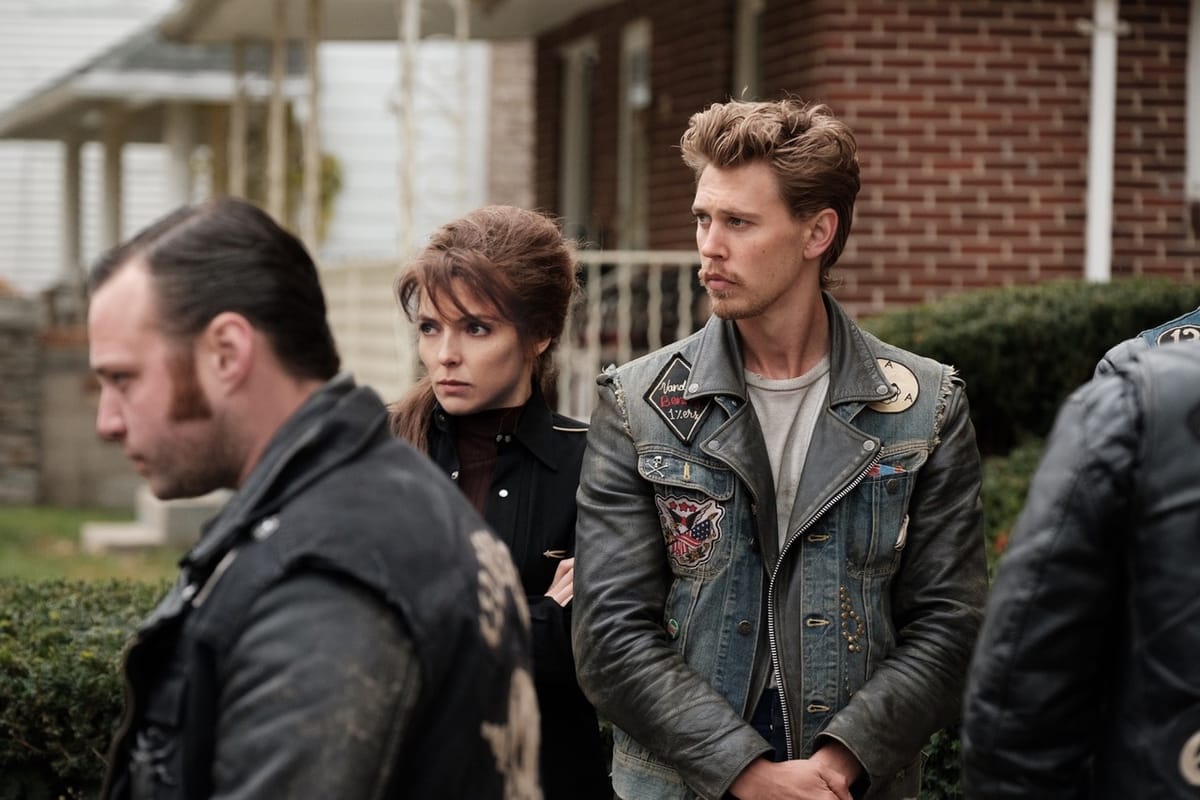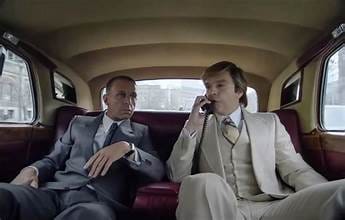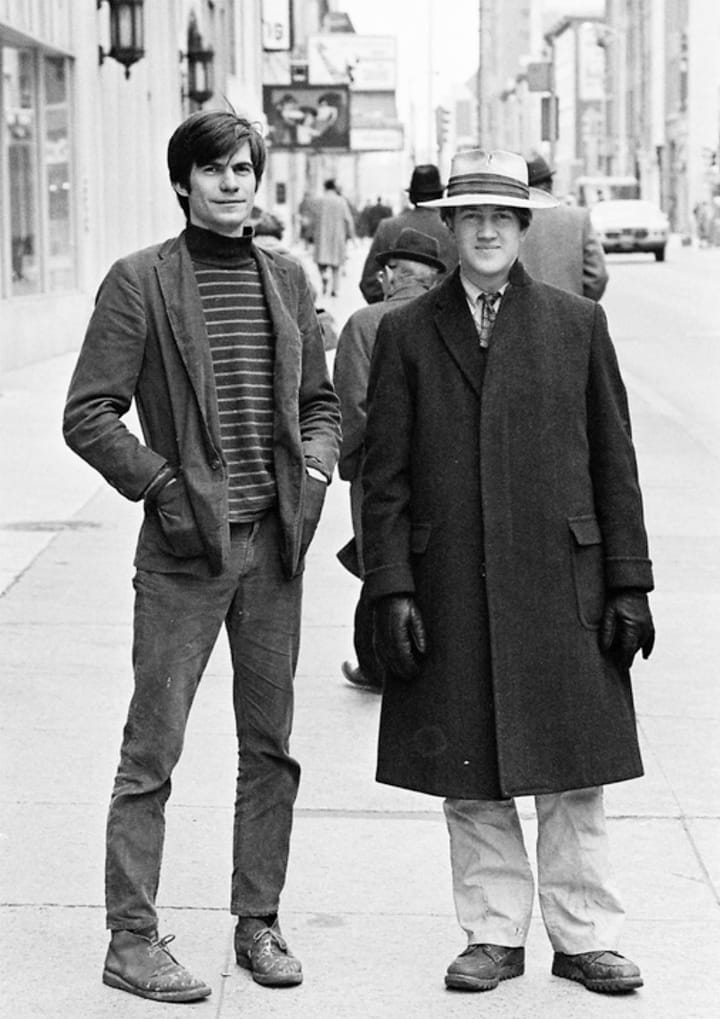"The Bikeriders" Keeps It Down To A (Mostly) Dull Roar

You know how, on rare occasions, you’ll see a couple somewhere past their forties, maybe in a humble diner in Florida, and you’ll think, “Those two—they have a story.”
This kind of realization is where Jeff Nichols’ “The Bikeriders” seeks to deposit us, and it is no small virtue that the film manages that. We meet a couple—played Austin Butler and Jodie Comer, no less– in their tumultuous youth. Chances are you'll walk out thinking about where they’ll end up.
It’s not mere nostalgia to feel the film's Sixties-into-Seventies story is making you wish for that simpler America, the one before the Silent Majority rose up. For a few post-WWII years, the populace widely shared a love for a blatting motorcycle, a love that that hinted at a nonpartisan (and yes, helmetless) form of freedom.
And if the movie does nothing more than remind us that Jodie Comer, at 31, has fully arrived as one of our best actors, it has done plenty. Nothing against Margot Robbie and several other fully hatched female stars you might name, but to contemplate a comparison of scene-by-scene performances is to wonder if the longer-established ones may feel they’ve brought fists to a knife fight.
Comer did all she was asked as the center of a triangle in the big swing that was Ridley Scott’s 2021 “The Last Duel” and she owns a shelf of British stage-acting awards. If you’re previously acquainted with her performance opposite an also-terrific Sandra Oh in the four seasons of the BBC’s “Killing Eve,” you know how she brought a manic, bug-eyed humor to that two-hander’s nominally lethal business. What Richard Lawson says in his insightful Vanity Fair review of Nichols’ film was already true then: “One starts to see a glimmer of something Streepian in her, a whirring mind and an innate aptitude for transformation.”
Up against such a marvel, love interest Austin Butler as the moody rebel Benny sagely lands on a sort of James Dean interiority. His Bennie and her Kathy are Bonnie and Clyde redux--though tamer and offering only the barest clues to just what depths they share. A Dean-adjacent remoteness is all that’s left for Butler to play, given that Tom Hardy’s leg of the lover’s triangle is delivered as a frank Brando impersonation. The film's device is that we see Johnny the moment he sees Brando in “The Wild Ones,” and the result is that Hardy reverse engineers the role, as a Methody actor unveiling a Methody biker boss inspired by a Methody Brando.
It's complicated, but the gearing is delivered in the form of the numbed Hardy steadily executing what thespians call “business”. We watch a world-record amount of lip-and-digits ritual with cigarettes in almost every dialog scene, and in those moments when Ben or Johnny is tasked with a response, and they get their mitts or mouth on a cancer stick, you may find yourself so desperate for the next line to arrive through the smoke streams that you are very near to bawling, in the fashion of Brad Pitt at the end of “Seven,” “What’s in the box? What’s in the fucking box?”
Comer’s ever-puzzled biker princess Kathy offers takes that are sometimes mournful (some years later) or accidentally funny in their vernacular oddity. (Vulture’s Alison Wilmore liked seeing Comer navigate her messy kingdom: “I used to be respectable,” [Kathy] sighs with a Gracie Allen chirrup."). She’s our Homer in this campfire Iliad, even as we’re left on our own to puzzle out the deeper emotions or throttled lust the two key lads may be feeling.
Nichols regular Michael Shannon is on board, and for all his great virtues, in this incarnation he doesn’t sink the fancy pool shots. As a slightly older member of the Vandals motorcycle club, his Zipco is so mumblingly loquacious that his chums stare at his dogged soliloquies with despairing wonder. Not to trigger any Latvian immigrants sharing Zipco's back story, the guy who can be so scary and potent elsewhere is playing a vacant "more-cowbell" sort of oaf as if Nichols had told him to land just this side of Beavis (in hair and makeup that do him, and our credence, no favors).
Hardy’s occluded psyche presents problems In a film that can’t quite plumb his depths even as it has the guts to mock its gaggle of wanna-be tough guys (no “Sons of Anarchy” they) who worship him. What unites Benny and Johnny is that both exhibit a wearied death wish, and one thing that keeps the stolid plotting alive is waiting to see who might get that wish.
In fact, the opening action scene of the film seems almost slapped into that key spot by a canny editor who wanted to show the who-gives-a-fuckness of Benny. But in a realm where the Ryan Goslings of the world can take care of the violence business when need be (as in “Drive”), Benny displays zero tactical sense in a barroom confrontation.
Though Butler gamely slow-burns an array of flinty stares from the start, he carries little menace after we see him brawling with sloppy abandon on several occasions. (The Paul Newman performances that enchanted the young Nichols --e.g., “Cool Hand Luke,” or how about my favorite, “Hombre”?–might have served as a better model.)
Credit to Nichols’ ambition for conceiving of the film as at some level a documentary—but perhaps he’s almost too bewitched with the ordinary- Joe’s-in-leather authenticity of the inspirational Danny Lyons photo saga that lent his movie a name and creative template.
it would be nice to shed some praise on the skilled Mike Faist as the Lyons character, but his interviewing style is inert. Lyon had a great eye which Nichols often replicates, but there’s a wide gap between seeing a moody Edward Hopper painting and seeing the painting’s brushwork drying–and the interviews conducted by Faist are very much in the latter category.
It’s these conversations, even with the never less than watchable Comer, that contribute to what The New Statesman’s reviewer noted: “A strange torpor envelops Jeff Nichols’s study of a Midwestern 1960s gang."
Paul Schrader, who knows a thing or two about writing and staging the junction of violence and messianic impulse, called it a “cool film” but also could not puzzle out if was ultimately “…pro-biker or anti-biker? Nichols' inability to resolve this contradiction keeps the film from having narrative satisfaction.”
The entire effort is rather low-impact compared to say, Nichols’ fine 2016 “Loving," which was both sobering and inspirational in showing Joel Edgerton and Ruth Negga’s fight to live as an interracial couple. Their dilemmas were etched with a deep societal context; but here, not so much. Time’s Stephanie Zacharek, in calling the film “lifeless and listless” might make you painfully grin at her lack of buy-in to the film's sketched-in deeper meanings: “The trials and troubles pile up, and before you know it, it’s the end of an era.”
A brief plunge into the devouring Teeth Mother known as AI will equip Nichols fans with a fair few reviews praising the film, and it gives one no joy to grouse on about a miss from an honest auteur who’s trying to keep the indie flame burning in a world of low-brow studio IP.
One last thought, as we all root for the film industry to keep making fare that’s this earnest and thoughtful, this hard-won. Do what I did and go to a real movie theater (in my case, the sold-out Friday at 4 p.m. at the local Cinemark with its great sound and big screen.) When the marvelous Comer nips onto the back of Butler’s hog and Nichols’ go-to cinematographer Andrew Stone puts us in the middle of the biker pack as they ride through flatlands in an anthemic, ritualistic coronation, the soundtrack going full blast and the surround-sound bass notes roaring throatily around us, it’s a gulp of soaring cinema that in its own right is worth the price of admission.





Comments ()